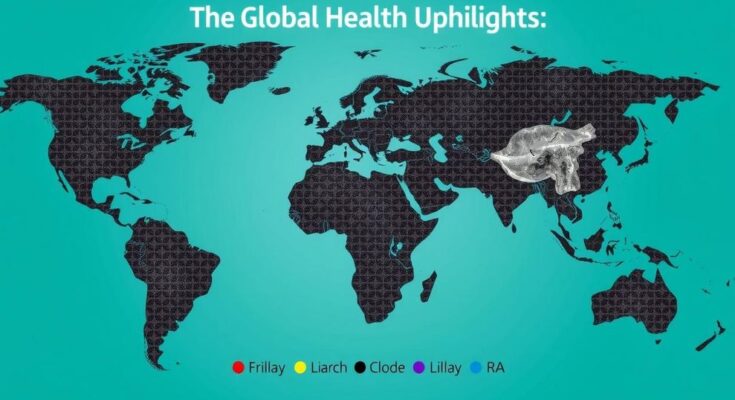In 2024, global health discussions were dominated by the impacts of climate change, the resurgence of infectious diseases, the integration of technology in healthcare, women’s health disparities, workplace wellness, and the persistent threat of antimicrobial resistance. Significant commitments and reports underscored the urgency of addressing these interconnected issues to enhance health outcomes worldwide.
In 2024, global health emerged as a crucial topic, influencing widespread discussions and debates, particularly at the World Economic Forum. Key issues ranged from the health ramifications of climate change to the escalation of antimicrobial resistance and advancing women’s health equity. As such, various significant developments took center stage this year.
Firstly, the adverse effects of climate change on health were profoundly acknowledged. A joint report by the Centre for Health and Healthcare and Oliver Wyman, “Quantifying the Impact of Climate Change on Human Health,” forecasted that failure to address climate change could lead to approximately 14.5 million additional fatalities and economic losses totaling $12.5 trillion by 2050. The G20 health agenda in 2024 and the health day at COP29 underscored this intertwined relationship between climate crises and health inequities, particularly affecting marginalized populations.
Additionally, 2024 experienced a resurgence of communicable diseases, prominently featuring measles and mpox. Reports from the World Health Organization indicated a 20% surge in measles cases, attributed to the spread of vaccine misinformation. Similarly, the mpox virus prompted a public health emergency declaration following its new strain detection. Dengue fever also witnessed alarming growth, nearly doubling its cases compared to the prior year.
Moreover, technological advancements in healthcare gained momentum, particularly with generative AI’s integration. The report “Patient-First Health with Generative AI: Reshaping the Care Experience” examined practical applications in diagnostics and treatment. Although these innovations aim to alleviate pressure on healthcare systems, challenges persist, particularly in low-income regions where misapplications of AI could pose risks.
Women’s health remained another focal point, revealing substantial health disparities. An associated report with the McKinsey Health Institute emphasized that women, despite longer lifespans, endure 25% more of their lives in poor health. Initiatives aimed at placing women’s voices at the forefront of health dialogues are vital for societal and economic progress.
Workplace health, encompassing employee mental well-being, demonstrated significant ties to overall economic health. The influence of poor mental health on productivity highlighted the pressing need for corporate responsibility towards workplace wellness.
Finally, antimicrobial resistance (AMR) posed an ongoing global challenge. The second AMR High-Level Meeting hosted by the United Nations resulted in commitments to reduce AMR-related deaths by 10% by 2030, alongside financial pledges for national action plans. Projections indicate potentially catastrophic drug-resistant fatalities reaching 169 million by 2050, underscoring the urgency of improving access to essential antibiotics.
The global health landscape in 2024 was shaped by a multitude of complex challenges, particularly due to the ongoing effects of climate change, increased communicable disease outbreaks, and the urgent need for health equity. Reports from authoritative institutions underscored the significant relationship between environmental changes and health outcomes, while the rise in diseases such as measles and mpox was linked to public health initiatives and vaccine hesitancy. Furthermore, technological advancements in healthcare indicated both progress and associated challenges, especially concerning equitable access across different regions. Women’s health and workplace wellbeing emerged as critical areas requiring attention to enhance overall health outcomes in the global population. The persistent threat of antimicrobial resistance demanded international coordination to address and mitigate its far-reaching implications.
In conclusion, the year 2024 revealed critical challenges and advances in global health, emphasizing the intertwined nature of climate change, health equity, and technological progress. As countries continue to navigate the resurgence of infectious diseases and the persistent threat of antimicrobial resistance, the necessity to prioritize women’s health and workplace well-being was highlighted. Collaborative efforts and strategic actions will be essential to addressing these global health issues effectively.
Original Source: www.weforum.org




